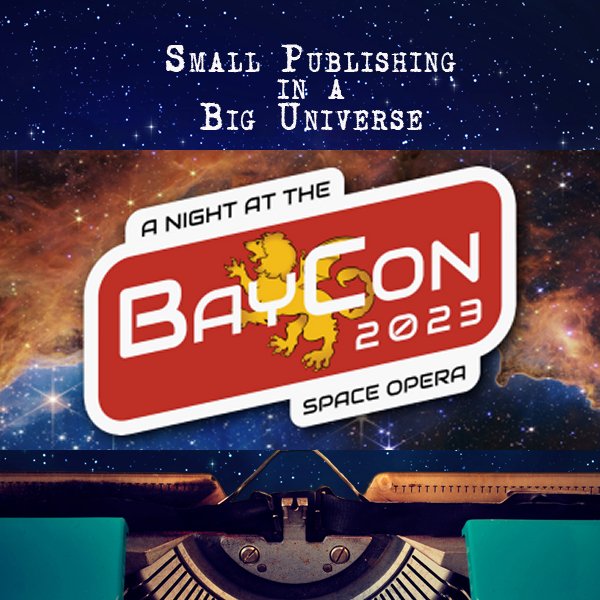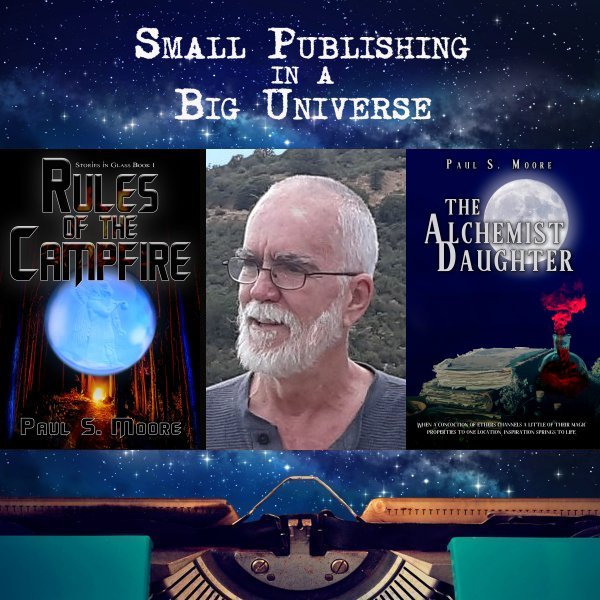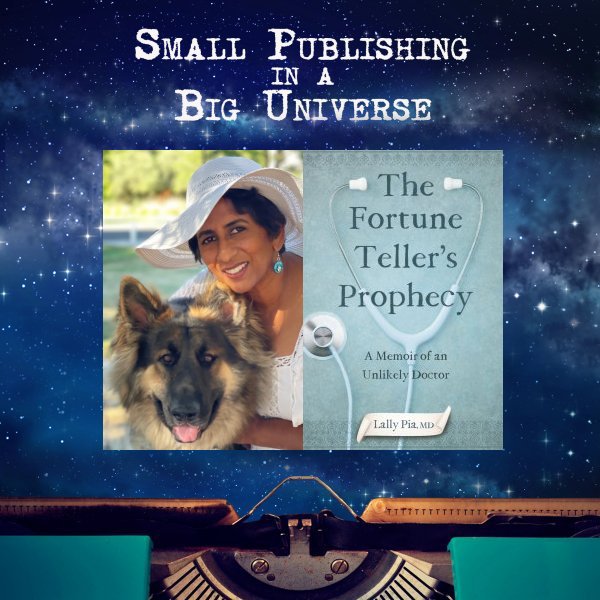[00:00:08] Speaker A: Welcome to small publishing in a big universe. I am your host, Lisa Jacob. This month, we have a special interview with author David Gerald. We also have new announcements, so stay tuned. Coming from our sponsors this month from what a dragon publishing Killian book one of whispers from a hidden world by TN Tarrant. Dragon Gems has the spring 2024 anthology paper. Angel Press has the library of everything by Hunter Terrell.
Killian Book one of whispers from a hidden world by TNT Love, duty, and consequence, an alien love story. Regent Killian Laurestes survived a harrowing attack and the betrayal of his family by his mother. Since then, he worked to help them all recover. Shiloh Zarykis is seeking sanctuary from a marriage that he doesn't want. When he winds up under the protection of Killian. Killian takes him in, protects and supports him, and they find themselves falling in love. But will social objections, personal insecurities, and a plot seeking revenge against them destroy their chances of happiness? Killian Book one of whispers from a hidden World is available in trade paperback editions, hardcover editions, and digital editions. For more information, go to waterdragonpublishing.com killian.
[00:02:05] Speaker B: This is small publishing in a big universe. I am guest host Brian Buhl, and I'm delighted to be interviewing David Gerald. Thank you so much for giving me.
[00:02:15] Speaker C: Some of your time for this.
[00:02:16] Speaker B: My first question is, you've been in the trenches for a long time, since the cretaceous era.
[00:02:22] Speaker C: Yeah.
[00:02:23] Speaker B: And not all of that time has been easy. What has been your trick for having that longevity and getting through the hard times?
[00:02:31] Speaker C: The publishing industry and the television industry was totally different when I started, and I think it was a lot simpler, partly because there was a lot less competition. And if you knew what you were doing, you were in demand. Today, there's orders of magnitude more people that you're competing with. Your job is, is the first job is always to be on the top, to be the best, better than everybody else, because then you are in demand. But that gets harder because competition has gotten so ferocious. So my advice is a little different, and it's weird advice, and I'll tell you why. My advice is, be yourself, be authentic. And the problem is that people who are under 30, and I speak from personal experience, is you don't know who you are for the longest time. You're trying on different hats. You're doing all the different performances. You're trying to, you're trying to figure out who you are. So just say, be yourself or be authentic. It's just, it's not quite enough. I would say, ultimately try on different hats, try different things, explore. It's not decide who you are and be that person, it's find out who you are by having the adventures that define yourself. So for me, in the twenties, part of my adventures was to travel a lot and to write a lot and to meet as many people as I could. And I tried about six different careers. I worked as an animator, I tried stand up comedy, I tried acting. But I always found writing to be a very solitary but very satisfying activity because I didn't have to get involved with other people. Writers tend to be introverts and sit alone in a room and talk to yourself. If you say anything good, you tighten it up. So my best advice would be have adventures and that will tell you who you are and then work from that core, that source of who you are.
[00:04:25] Speaker B: So it's live an interesting life. So you have something to say.
[00:04:28] Speaker C: Yeah, yeah. Harlow Nevelson said it very nicely. The job of the writer is to go to the other side of the mountain and come back and report.
And I think that's really the job, is to go and be the most interesting person you can. Now I admit there were opportunities I was offered and I backed off because they didn't look safe. Because taking care of your own well being has to be primary, otherwise you have nothing to give to anyone else. A little godsmacked, eh?
[00:04:56] Speaker B: A little godsmacked. So you mentioned that things seem a little bit different today than.
[00:05:03] Speaker C: Is there anything?
Come on. You know, once I was 20, now I'm 80. There's a difference. I'm functioning a lot slower. But there are things I know today that I could not have known when I was 20 or 31. Of the things about experience is that you look at things differently. For instance, I look at all of the online feuding, fighting and trolling. I don't get involved in it anymore. Why waste any energy when there's more important things to do? Whereas when you're 20 or 30 being right, having them, winning those fights seems very important. But it isn't.
[00:05:39] Speaker B: I've seen you don't waste time on the trolls.
Very out there.
[00:05:44] Speaker C: Locked.
[00:05:45] Speaker B: They go.
[00:05:46] Speaker C: Well, I realized the fights I got into when I was 20 or 30, nobody remembers them. They're forgotten. I don't even. And I think about it and say, why did I even get involved in that? That was stupid to get involved in arguing over something. I'd have been better off just ignoring it. You ignore stuff that goes away. You invest energy in it, it sticks around. So nowadays, and this is probably one of the most sin things I could say to anybody. Only invest energy in things you want to have. Stick around. So that's really positive stuff. Play with the dog, play with the grandkids. Spend some time with your son or daughter. Spend some time with your parents. Spend some time with your best friends.
Be very careful with your relationships. Have a rule about relationships, all relationships. Am I contributing to you? Are you contributing to me? The answer to either of those questions is no. There's something wrong with the relationship. And to quote one of the very smart people I knew, kill it or cure it. And some relationships can be cured, and some you walk away from.
[00:06:51] Speaker B: As a working writer, and you're working now. Are there things that you think are better than they were? Is there anything that's positive with the.
[00:06:59] Speaker C: Changes that we're seeing today? Well, there's an old saying, the rising tide lifts all boats. And I think that the quality of the genre, fantasy, horror, science fiction, all of it, has risen remarkably. And I don't mean this in any way to say that the past was wrong.
It's we're standing on the shoulders of giants, and we have learned from them, and then we've learned a lot. There's a lot more science, a lot more awareness. And so the level of mediocrity has risen. That even a book that we might consider mediocre today would have been groundbreaking 50 years ago. And I think that represents an enormous quality of growth in the field. And part of that, I believe, is the work of editors like Fred Pole, for instance. John W. Campbell was a good editor, but he was very limited. He only bought certain kinds of stories. Then you get editors like HL Gold and Fred Pole and Anthony Boucher who were willing to go beyond what John Campbell was doing. And that was dominating the fifties and much of the sixties. And then Harlan Ellison came along, and Harlan said, we're still living in a ghetto. And he published dangerous visions, and again, dangerous, and essentially said, there are no boundaries. And that opened up the world of the genre. So much so that we got, well, my own manifold himself couldn't have been done before that. But we had Ursula Kaylee Quinn's left hand. We had Bill Varmer going way outside to. And then there was the so called new wave. And there were so science fiction kind of blew up in the sixties and seventies, where writers discovered there was no limitations, there was no box to get out of. And the result today is, yeah, there are a lot of people working the same old familiar tropes of dragons and elves and the same thing in science fiction, space war here, variations on military of the future and so on. But then you get people who move beyond that. There's Matthew Hughes, who's going beyond what Jack Vance has done. There's, I can't remember her name, but she wrote the fruit and flowers of Hawaii, which changed the whole vampire trope that was won the nebula. Well, I think, like NK James, I bought her books and it bothers me that I'm terrible with names, so I apologize. But on the one hand, and this is praise, by the way, John Scousey is working a lot of familiar tropes, but he turns them inside out. Old man's war, Kaiju preservation society. So on the starter villain, he turns things inside out, finds new things in there. And a lot of his stuff could have been published years ago, would have fit in. But then you get writers who are, and by the way, that's a compliment, because I do like the familiar structures of science fiction turned inside out and explored and what are the ramifications that we previously missed. So I like John's work a lot. And I could also mention John Varley. You cannot find a bad John Varley book. He's incapable of writing a bad book. And I just reread a bunch of this stuff just for the fun of it because he'll take an idea and come with it as far as he can go. And he, again, he's an example of somebody going out beyond thought. And his nine worlds books are just great. But I would recommend that a lot of new readers go back and look at what was done in the past to see whose shoulders were standing on Joanna Russ, the female man, Annie McCaffrey, the ship who sang Larry Niven's ring world, simply because those established a level of let's go beyond what has previously been established and see what's happening.
[00:10:44] Speaker B: As I go and I visit Barnes Noble and I look at different sections, I am personally dismayed to see the science fiction section shrink as much as it has. Do you think that there's something to that or is just, is science fiction just generally everywhere now?
[00:11:02] Speaker C: Well, science fiction has replaced the western. The western used to be the most ubiquitous genre, and it kind of died out in the sixties. We still get westerns, but not like there's one time when all 14 of the new series on television, mid fifties, were all westerns. That was all anybody was producing. But now it's science fiction. And every year there are new science fiction series. Some of them win, some of them lose, some of them survive, some of them don't. But what has happened is science fiction has moved into the mainstream. And if you look at the best seller list, here's the Handmaid's tale. That's an alternate reality. Here's the time traveler's wife. That's a science fiction story. Anything by Kirk Vonnegut. It was considered mainstream slaughterhouse five, but Kurt Vonnegut did a lot of the sirens of Titan, and Kurt Vonnegut made up his mind you would never allow him to be categorized as science fiction. But he wrote science fiction. If you look at mainstream, at least three quarters of the books on any bestseller list has some kind of science science fiction element. Now, what still is called the science fiction genre, a lot of that stuff is better than some of the best selling stuff that's considered mainstream. A lot of the hardcore science fiction is still going places that mainstream isn't. I think it's an artificial determination kept in place by those who believe in a kind of literary fiction. I don't believe in literary fiction. I believe in fiction that you keep turning the page regardless of what it's about, whether it's a Harlequin romance or an old Perry Rodin. If you're turning the pages, the author got the job done. I tend to aspire a little bit more. The Beatles once said they would never write the same song twice. And that's kind of my own feeling is what story haven't I written? What story do I want to read and nobody else has written? And what story demands that I write it? And what happens if I just sit down and start typing? I am told that you can't define the typical David Gerald story. Just whatever is in front of me, I want to find out what's next.
[00:13:01] Speaker B: Are there no tropes that you enjoy re exploring or.
[00:13:05] Speaker C: Well, Robert A. Heinlein and I were good friends, and he once joked, he said, david, why don't you write boy meets girl? And I said, as long as you're giving me an idea, I'll give you one. The man who knew better. And Einline wrote about competent men and women. And I like reading about confident characters. I like reading about characters who are ambitious enough to solve their problems. And by the way, that also includes the curious incident of the dog in the night. And I forget the title, where the woman wakes up amnesiac every day and the only way she knows her past is she's keeping a journal, which is a brilliant novel. I like confident people. There's a wide, wonderful couple books about a person who wakes up in a new body every day, borrow somebody's identity for a day. That was a really interesting book because the second book in the series became a mystery and a love story. So I like stories about competent people solving difficult problems, and that's really what the best writers do, is create interesting problems and then have to figure out how to solve. And I like that. A book that stretches your mind like the waistband of your underwear, it never goes back to the same way.
[00:14:15] Speaker B: So I want to thank you for your time, and I also want to give you an opportunity to talk about anything else you want to talk about is anything that you're working on or anything that.
[00:14:24] Speaker C: Yeah, thank you. I just published in Analog a story called Ghani goes to War, and it's about interplanetary conflict and it's political and it's economic.
And I discovered in the writing of it that you really don't want to have an interplanetary war. Nobody wins, and the weaponry is not what we would expect from Star Trek. I'm finishing up the sequel to Hella. Hela is available on Amazon and everywhere else, and was very well received, and I had great fun inventing this new ecology. And then after Hella, I am finishing up a book called Nest for nightmares, which a lot of people have been waiting for for a long time.
[00:15:03] Speaker B: Thank you again. This has been Brian Buhl with small publishing and a big universe.
[00:15:20] Speaker A: The library of everything by Hunter Tyrrell. This philosophical narrative follows a group of everyday people who find themselves in a mysterious, dreamlike library of everything, where every drop, every star, every person has a book about their story detailing the whole truth of their past, present, and future. Upon discovering that the books can be altered by visitors, thus changing reality, our characters set out into the infinite library to find their own books, to change them, to repair broken pasts and secure better futures. Ultimately, they have to work out their own place as characters in this story. The Library of Everything by Hunter Terrell is available this month from Amazon, Barnes and Noble, Kobo, Smashwords, and other online booksellers. Or support your local independent bookstore by ordering it through bookshop.org dot.
Our special announcement this month is our sponsors are open for Submissions paper, Angel Press, Water Dragon publishing, unruly Voices, and two new imprints, Cupid's Arrow and Graveside Press. Please go to SPBU dash podcast.com submissions for further information. Thanks again to our guest, and a special thank you to our guest host, Brian Bool. We plan on publishing new episodes every second Wednesday of the month. Watch for new episodes around that time if you want to know more about small publishing in a big universe, visit our website at SPBU dash podcast.com and subscribe to our newsletter. Send us your feedback by using the contact us link, like us on Facebook Spbupodcast Tweet or X USPU underlinepodcast. To find out more about the books and other products featured during this episode, please visit the SPBU
[email protected]. This podcast was recorded and edited by yours truly. Lisa Jacob executive producer is Stephen Radecki. Theme and add music is provided by Melody Loops. Enhanced transcription services are provided by Lisa Jacob. This month's episode was sponsored by Water Dragon Publishing and paper Angel Press. You can listen to our podcast on Apple Podcasts, Spotify, Amazon Music, and most of your favorite podcast services. Thank you very much for listening and talk to you soon.


